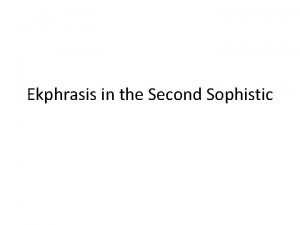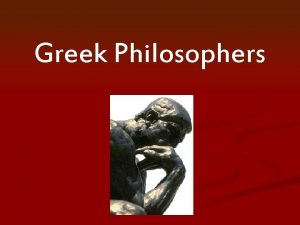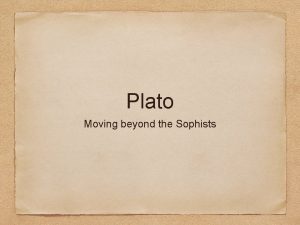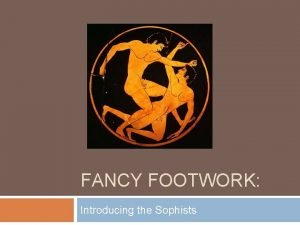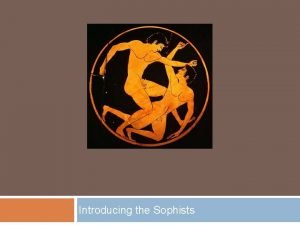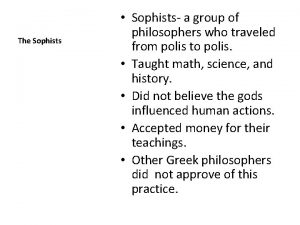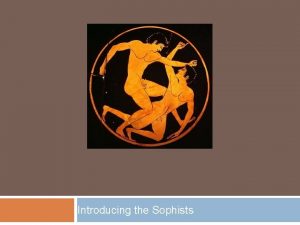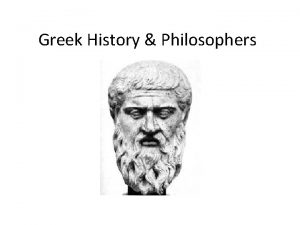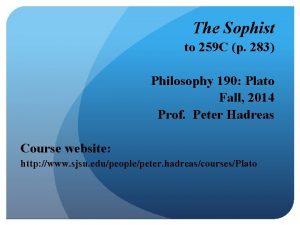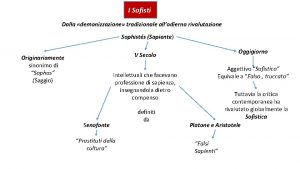Philostratus Lives of the Sophists A Sophist on















- Slides: 15

Philostratus Lives of the Sophists: A Sophist on Sophists, Part 2

A question…

Which reminds you more of our sophist friends? Why?

Agenda • Class Exercise (cont’d) • • Rhetorical Analysis and Contradiction (of Philostratus) Discussion • Sophistic as agōn in Philostratus philostratus lives of the sophists 2 1 -feb 2018 4

Class Exercise (cont’d) Rhetorical Analysis and Contradiction (of Philostratus)

Discussion Sophistic as agōn in Philostratus

Discussion Questions • • How in our Philostratus’ Lives is sophistic an agōn? Theoretical Frame • What is at stake? philostratus lives of the sophists 2 Bourdieu • Field • Habitus • Cultural capital • Zero-sum game • Other? ? 1 -feb 2018 7

Discussion continued. . .

Polemon of Laodicea (90– 146 CE) Herodes Atticus (ca. 101– 177)

Polemon’s School “By opening his school at Smyrna he benefited the city in the following ways. In the first place he made her appear far more populous than before, since the youth flowed into her from both continents and the islands; nor were they a dissolute and promiscuous rabble, but select and genuinely Hellenic (neotētos … katharōs hellados). ” (pp. 105– 107)

Eskhēmatismenai hupotheseis “I observe … error in the case of those who hold that [Polemon] was not qualified to sustain simulated arguments, … and that he deprecated the use of these themes when he quoted … Homer: “ ‘For hateful to me even as the gates of hell is he that / hideth one thing in his heart and uttereth another. ’ “Perhaps he used to say this with a double meaning…; nevertheless, these too he sustained with great skill, as is evident from his Adulterer Unmasked or his Xenophon refuses to survive Socrates…. ” (p. 131)

Herodes and Polemon’s “Fee” Herodes says that in payment for this he sent him 150, 000 drachmae, and called this the fee (misthos) for his lectures. But since he did not accept it, Herodes thought that he had been treated with contempt, but Munatius the critic, when drinking with him (this man came from Tralles), remarked: ‘Herodes, I think that Polemo dreamed of 250, 000 drachmae, and so thinks that he is being stinted because you did not send so large a sum. . ’ ” (p. 123)

Adrian of Tyre (mid/later 2 nd cent. CE)

“Adrian used to drink with the pupils of the clepsydra. . Now a discussion was once going on about the style of all the sophists, when Adrian came forward in their midst, and said: ‘I will now give a sketch of their types of style, not by quoting from memory. . . but I will undertake to imitate them, and will reproduce extempore the style of every one of them, with an easy flow of words and giving the rein to my tongue. ’ But in doing this he left out Herodes, and Amphicles asked him to explain why he had omitted their own teacher. . ‘Because, ’ said he, ‘these fellows are the sort that lend themselves to imitation, even when one is drunk. But as for Herodes, the prince of eloquence, I should be thankful if I could mimic him when I have had no wine and am sober. ’ ” (Philostratus Lives p. 225)

“When he was still a mere youth Adrian invited Herodes to hear him make a speech extempore. Herodes listened to him, not as some people unjustly accuse him, in an envious or scoffing spirit (baskainōn te kai tothazōn), but with his usual calm and kindly bearing. . ” (Philostratus Lives p. 225) “He performed the duties of the chair at Athens with the greatest ostentation, wore very expensive clothes, bedecked himself with precious gems, and used to go down to his lectures in a carriage with silver-mounted bridles; and always after the lecture he would go home envied of all (zēlōtos), escorted by those who loved Hellenic culture, from all parts of the world. ” (p. 227)
 Philostratus
Philostratus Sophists are lovers of wisdom.
Sophists are lovers of wisdom. Sophists beliefs
Sophists beliefs Dạng đột biến một nhiễm là
Dạng đột biến một nhiễm là Thế nào là sự mỏi cơ
Thế nào là sự mỏi cơ độ dài liên kết
độ dài liên kết Trời xanh đây là của chúng ta thể thơ
Trời xanh đây là của chúng ta thể thơ Gấu đi như thế nào
Gấu đi như thế nào Thiếu nhi thế giới liên hoan
Thiếu nhi thế giới liên hoan điện thế nghỉ
điện thế nghỉ Fecboak
Fecboak Một số thể thơ truyền thống
Một số thể thơ truyền thống Thế nào là hệ số cao nhất
Thế nào là hệ số cao nhất Ng-html
Ng-html Sơ đồ cơ thể người
Sơ đồ cơ thể người Các số nguyên tố là gì
Các số nguyên tố là gì
